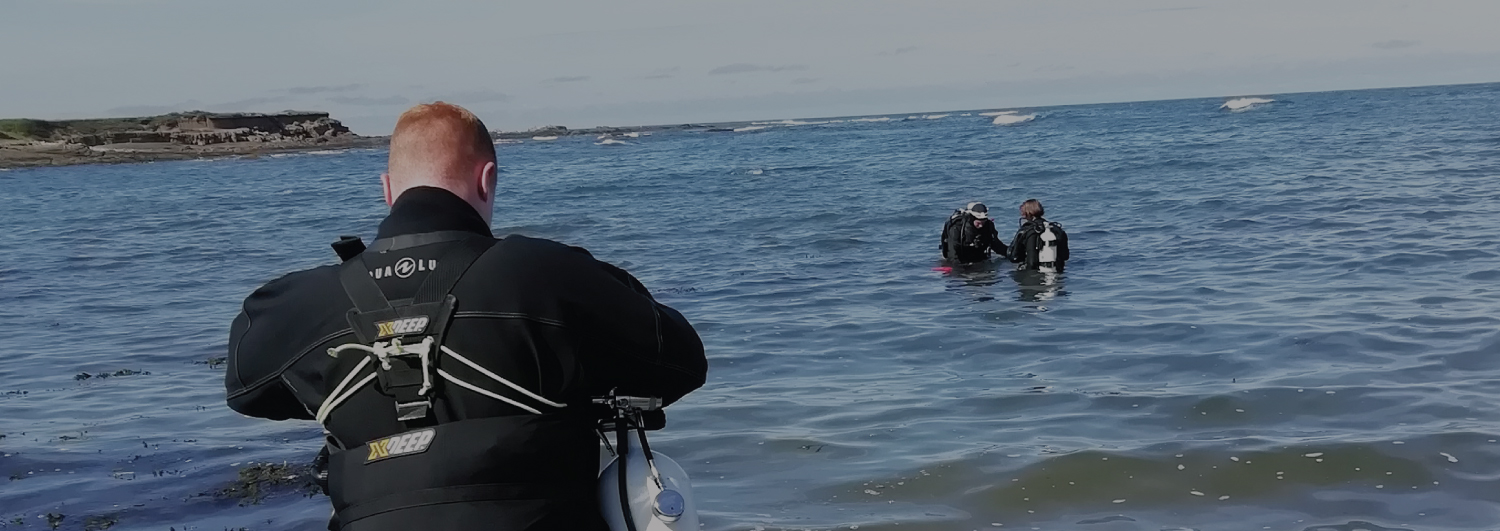
WHAT ARE THE LEVELS OF PADI CERTIFICATION?
Becoming a diver is literally one of the best things that has ever happened to me. I’ve been able to explore my passions inside and outside of the water, opening new doors and having access to so many opportunities along the way. When I first started diving, the PADI flowchart really hooked me in and I instantly needed to know more! So… there's no secrets here, I'm going to guide you through the amazing levels of PADI certification!
The PADI flowchart
This flow chart shows all of the available levels of PADI certification… there's sooooo many! Taking training is an awesome way to expand your diving, learn new skills and become the best diver you can possibly be. With so many different areas to focus on, there's something that will interest you. You definitely won't get bored!
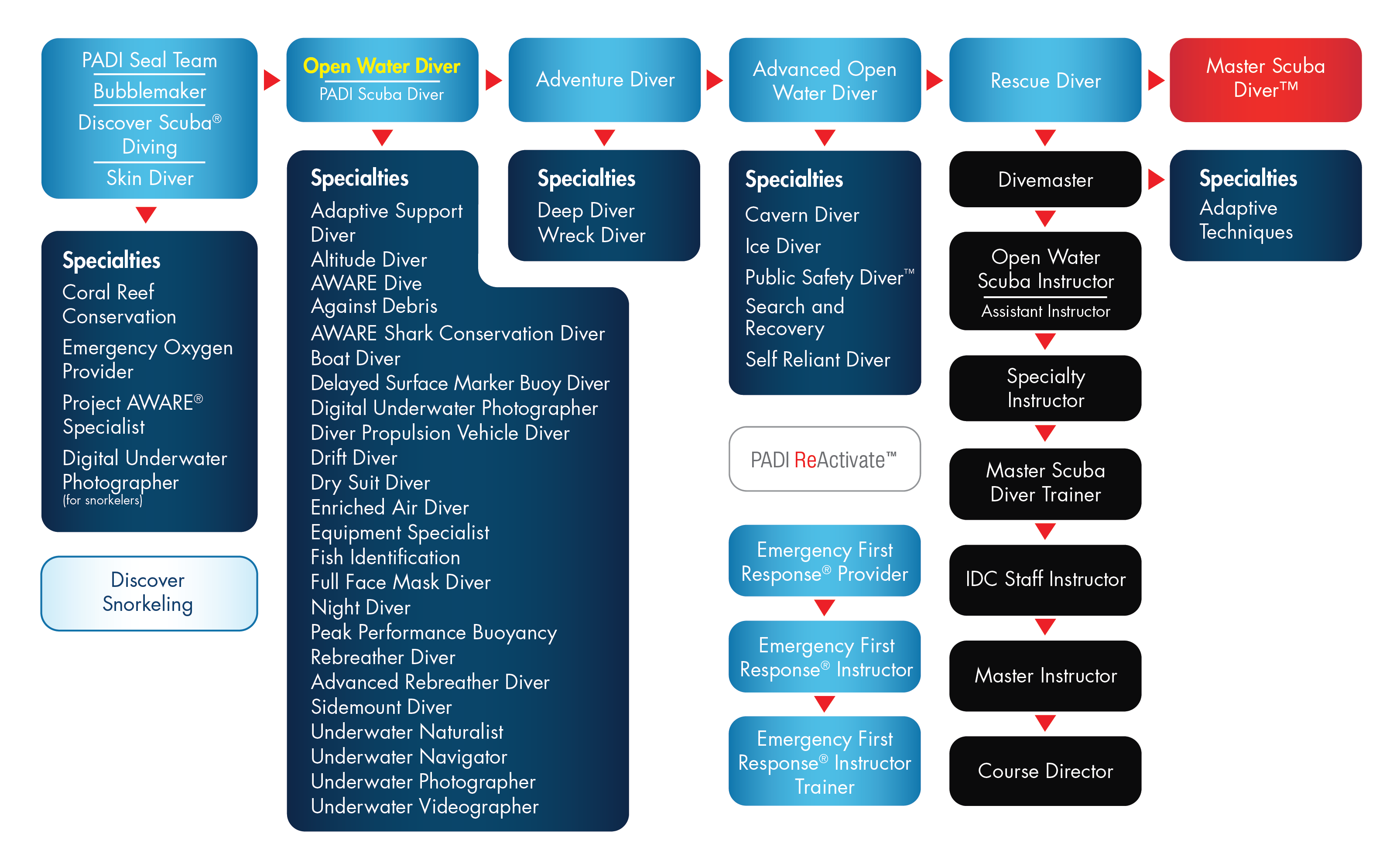
Recreational levels of PADI certification
PADI DISCOVER SCUBA EXPERIENCE
Where to start? Aaaah yes… right at the beginning! Discovering scuba diving. This is where you get to test the water (pun totally intended) and see if scuba is for you. You'll jump in with your instructor to take your first breaths underwater. You'll learn some basic skills and have an absolute whale of a time!
To take a discover scuba diving session you must be at least 10 years old, but don't worry if your kids are not quite 10 yet - they can do a Bubblemaker course or become a member of the Seal Team from the age of 8! Start 'em young, ey? Seal Team allows youngsters to develop their diving skills. They'll test out scuba equipment for little ones (you should see our cute mini scuba kits for kids at The Fifth Point!) and meet like-minded individuals, not to mention having SO much fun, duh! If you're interested in getting your kids into diving, get in touch!
After a discover scuba diving session, I guarantee you will have fallen in love with diving! The next step is Open Water. This is your beginners license and the skills you learn on your discover session can actually credit towards this course! You're already well on your way to becoming fully certified!
PADI OPEN WATER DIVER
Open water is the start of your diving journey. Here you will learn the core skills of scuba diving. For example, putting kit together, mask clearing, kit removal, snorkelling and so much more fun stuff!
You will be officially certified to dive to 18 metres with your buddy anywhere in the world, awesome right?! But the fun doesn't stop there... at The Fifth Point, we include extra courses in your Open Water package to set you up for success on your scuba diving journey.
We are mad keen on protecting the ocean and during your training, you will realise that as a new scuba diver you have special powers. You can use your skills to help protect the ocean! You'll complete the Project AWARE specialty course and we focus on diving with a purpose and protecting what we love!
We also keep your UK diving adventures going all year round by teaching you to dive in a drysuit. The PADI Drysuit Diver specialty course is perfect because it can get canny cold in the North Sea! Wearing an appropriate exposure suit is essential for safe and comfortable diving. Although we do have a few regulars who are pretty hardcore and dive wetsuit regardless of the water temperature!
It should be noted that any certifications (Open Water/ Advanced Open Water) completed by under 15-year-olds is counted as a ‘junior’ cert. This just means that there will be some extra safety precautions such as depth limits and supervision requirements. In PADI's eyes, they turn into an adult at 15 and these rules are lifted.
PADI ADVANCED OPEN WATER
Advanced Open Water is the next step on the levels of PADI certification ladder. It builds on what you've learnt in your Open Water course. The common misconception is that you need to be advanced to take this course, perhaps with more experience and logged dives. This isn't the case! The Advanced Course is designed to develop your skills as a diver and is actually perfect when done straight after the Open Water Course. You will gain more experience under the watchful eye of your instructor.
You'll learn key new skills in navigation and you'll also do your first deep dive. The really cool thing about this course is that you can customise it to fit your interests. If you want to learn more about fish, let's do it! If you want to dive on a wreck, let's go! If you want to experience what it's like diving in the dark, we'll organise a night dive!
Once qualified you can dive down to 30 metres and you'll have another 5 dives in your logbook.
Remember I said that as a diver you have superpowers? During your Advanced Course at The Fifth Point, you'll become a citizen scientist too! You'll take the PADI Dive Against Debris speciality so that you can directly tackle the messy problem of marine debris by removing rubbish from the water. Once you've collected it, you'll create data by submitting surveys to Project AWARE. Every dive we do at The Fifth Point is a Dive Against Debris survey dive. We make every dive count towards protecting the ocean.
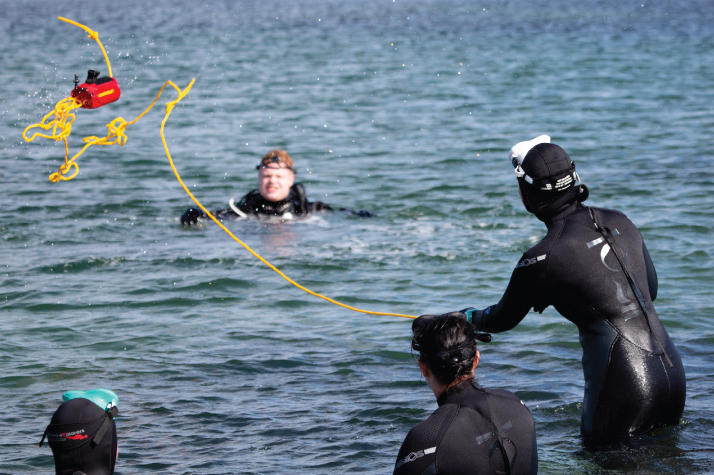
RESCUE DIVER
The Rescue Diver course is often referred to as most divers favourite. However, it is a little different to the ones you've experienced before. Instead of focussing on your own skills, you'll be learning how to tackle situations involving other divers - your buddies or others in the water. The chances of needing to rescue someone are slim, but when you learn how to respond to emergencies your confidence as a diver grows plus everyone will want you as their buddy!
The prerequisites for this course include Advanced Open Water and an up to date First Aid certification. But don't worry if you need some first aid training - we've got you covered! You'll learn everything you need to know from our friends at Life Saving Training. Helena and Ian are experts in outdoor first aid. They're Mountain Rescue volunteers and avid Rescue Divers themselves - their first aid courses are epic!
MASTER SCUBA DIVER
This is the highest of the levels of PADI certification that can be achieved before you turn pro. Earning this means you have major bragging rights, as you should because you've worked hard to get here! It's essentially the black belt of scuba diving.
The MSD rating makes you stand out from the crowd because fewer than 2% of divers achieve this status. You gain this rating through a significant amount of experience and scuba training that you have accumulated over your diving lifetime.
The prerequisites for this certification are Open water, Advanced Open Water, Rescue, 5 specialities and 50 dives. You can see how the accumulated dive experience makes you such an awesome diver! We’ve actually written a whole blog just on the Master Scuba Diver rating that you can check out!
Pro levels of PADI certification
DIVEMASTER
YAY, you're considering making your passion into your job. Let me tell you, you won't look back. If you're on the fence… do it, do it, do it! Ask any of us at The Fifth Point and we will tell you how mint it is! A DM is the life and soul of the party. It's your job to make sure that divers and students are having an awesome time! You'll guide dives and assist instructors during courses... and get paid for it!
During your Divemaster Program, you will have an absolute blast. You'll take part in hands-on workshops, learn how the PADI System of Education works and develop your dive skills to a god-like level.
To become a PADI Divemaster, you must be 18. You must also have your Rescue Diver certification, 40 logged dives and an up to date first aid qualification. By the time you finish the program, you need to have at least 60 logged dive.
If you’re under 18 and chomping at the bit… we got you! PADI have just released a junior DM course which is so exciting! It's open to 15-17 year old rescue divers with a minimum of 20 logged dives. After completing your course, you will be able to assist in skill demos, help set up and manage dives, offer surface support, conduct dive briefings and get involved with promotional activities. Epic right?! This is an awesome subset to the DM course which you can upgrade to at 18 and will allow you to gain valuable and essential skills to be the best DM that you can possibly be.
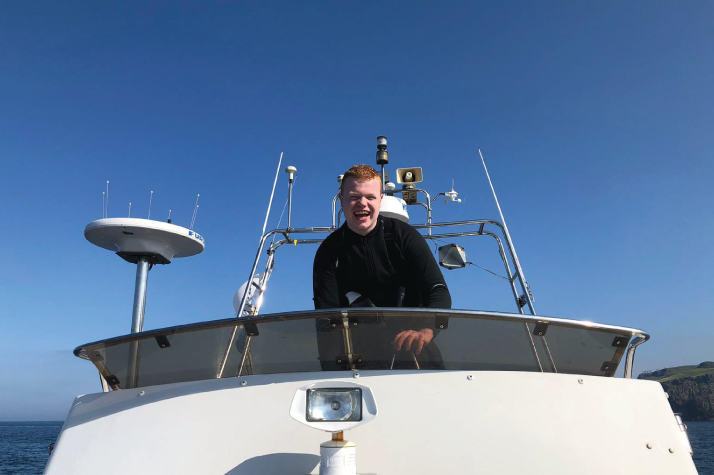
INSTRUCTOR
‘I can't imagine going back to a ‘proper’ job now... who wants to sit in an office instead of playing in the ocean all day?!’ Now that's a quote to sum up this incredible lifestyle if I had ever heard one! Co-founder and Course Director Nic here at The Fifth Point just loves that she decided to make her passion her full-time job and we are SO buzzed that you're thinking about it too!!! It’s going to be so fun. As an Open Water Scuba Instructor (OWSI) you can teach every single one of the levels of PADI certification that I wrote about above... and get paid for it. Teaching diving every day can become your full-time job and it's AWESOME.
To live this dream, you'll take the PADI Instructor Development Course (IDC). You'll be one of a really small group (we only ever work with a maximum of 4 candidates at a time) and over 16 days you will develop into an incredible PADI Instructor ready to inspire the next generation of scuba divers. As well as the PADI curriculum of workshops, you'll also learn how to teach in an environmentally conscious way and use the latest modern diving techniques like teaching neutrally buoyant in wing and long hose.
Prerequisites include being at least 18 years of age, having 60 logged dives which needs to be at 100 by the time of the IE (Instructor Exam), a current first aid certification.
MASTER SCUBA DIVER TRAINER
The Master Scuba Diver Trainer (MSDT) rating really sets you apart from other instructors and shows your commitment to teaching. A little word to the wise - having the MSDT rating on your CV will help you get that position you're after. You can offer more to the dive centre because you can teach a wider variety of courses compared to a bog-standard OWSI. This works in your favour too as you can avoid burn out from teaching the same courses every day - mix it up with specialty courses that you're really passionate about!
To become a PADI MSDT you must have certified at least 25 PADI Divers and have earned at least five PADI Specialty Instructor certifications. If you've got what it takes, any PADI instructor can take the leap!
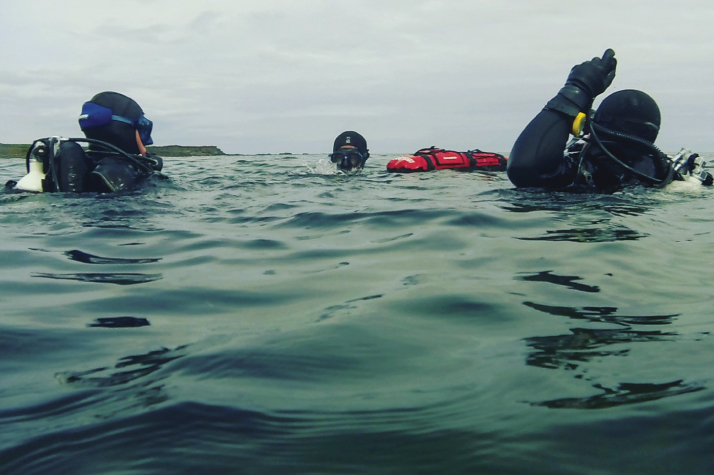
IDC STAFF INSTRUCTOR
Staff Instructors assist during IDCs. Ask any Course Director (including Nic!) and they'll tell you that the most important team members are their Staff Instructors. You're the real star of the show as you work with aspiring Instructor candidates to develop their skills whether that be in the classroom or in the water.
You'll find that taking this training makes you a better instructor when you're working with your own students. It makes you think about how you teach and deliver information because after this course you'll be qualified to teach other instructors how to teach! So much teaching! But it's right what they say, if you can teach someone else what you know then you've truly mastered the subject.
MASTER INSTRUCTOR
Master Instructors are recognised as elite dive leaders who through a huge abundance of experience and certifications have proven themselves as the best of the best. To become a Master Instructor you must have been a qualified PADI Instructor for at least 2 years, have issued a minimum of 150 diving certifications at various levels, issued 10 emergency first response course completion cards and have attended 3 PADI seminars.
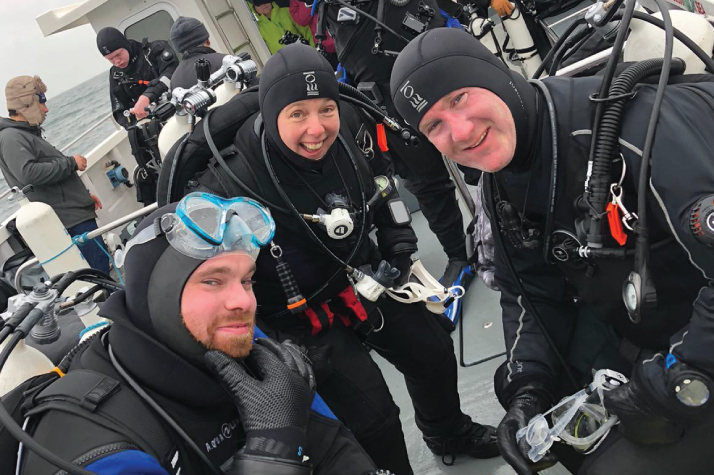
COURSE DIRECTOR
That's it, you've reached the top of the levels of PADI certification! Course Directors are among the most qualified and highly respected members of the diving industry. Your job is to teach the next generation of scuba diving instructors. The Fith Point's co-founder Nic is our resident CD so if you're coming to us it will be Nic and her gang of Staff Instructors as your mentors.
To become a Course Director, I'm not gonna lie… you need some serious training, experience and cash. You must be a Master Scuba Instructor, have assisted on several IDCs, be an EFR Instructor Trainer, have a minimum of 250 logged dives and have direct PADI work experience. If you start asking Nic how much time and money she's invested in herself rising through the levels of PADI certification, you'll definitely make her squirm. The Course Director Training Course alone is a whopping USD$ 10k. But, ask her if she'd change a thing? You'll get a big fat no!
Wanna get started on your next level of PADI certification?
Get in touch to discuss all of your course dreams. We are really looking forward to hearing from you and hope to see you when we’re next discovering under the waves!
Hello Team,
goodmorning and a have a great day ahead
i would like to know you that i am an Environmental Engineer and would like to take scuba diving license for my career growth in Environmental Engineering field,
so, kindly guide me which course would be suitable for my career growth as an environmental engineer with licensed scuba diver.
Thanks and Regards
syed ahrar jilani
0505312159
Hey Syed!
Taking your PADI Open Water Course will be a great introduction to the world of diving. Progressing through the levels described in this article will improve your knowledge of the underwater world.
However, if you wanted to work underwater (construction, surveying etc) you would most likely need to go down the commercial diving route. This is very different to the recreational levels described here.
Hope that helps!